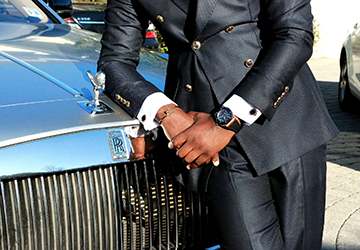Are you curious about the latest luxury trends to stay one step ahead in 2023? As the new year begins, the luxury industry is constantly evolving, offering exciting opportunities for brands to connect with audiences, build authority and raise awareness.
Did you know that the luxury industry is booming with sales exceeding $312 billion in 2022? In addition to this, the annual growth rate is expected to exceed 5%.
However, in the face of changing consumer behavior and economic headwinds, luxury brands need to differentiate in authentic ways.
This article explores the top 10 luxury trends to watch in 2023 and how they can take your brand to the next level.
Read on to stay ahead of the competition and position your brand in the luxury space.
Let's start!
The 10 latest luxury trends shaping 2023
Get ready to dive into the world of luxury as we dive into the top 10 trends that will shape the industry in 2023.
From the latest fashions to marketing trends, we have all the important information for you.
So let's dive deep into what is in the world of luxury!
1.Embracing E-commerce: The Future of Luxury Sales

Are you ready for a peek into the future of luxury shopping? As the pandemic prompts more and more consumers to shop online, luxury brands must seize the opportunity to capitalize on e-commerce.
According to experts at Statista, up to 25% of luxury sales are expected to happen online by 2025. Online shopping is no longer just for bargain hunters – it's also becoming the go-to choice for discerning luxury shoppers.
So if you're a luxury brand looking to stay ahead, you need to step up your e-commerce pace - and fast!
By embracing the digital world in a scalable way, you can gain a competitive edge and access the lucrative online marketplace.
2.Luxury Resale: Prioritizing Second-Hand Goods
Luxury resale is on the rise, and not just a passing trend. Major luxury brands such as Rolex, Balenciaga and Gucci are launching resale programs to allow consumers to shop more sustainably and strengthen brands' sustainability credentials.
Even online marketplaces like The RealReal and Vestiaire Collective are feeling the impact as luxury brands take control of the second-hand market.
LVMH recently launched Heristia.com, a curated platform for archival objects that offers a unique and personal experience with each purchase.
As luxury brands continue to resell indoors, the future of the online marketplace remains to be seen.
3.Luxury in the Metaverse
Luxury transcends the physical world and enters the virtual world. Virtual influencers, increasingly popular with younger generations and luxury shoppers, allow brands to amplify personal identities beyond physical appearance.
With Apple's mixed reality headset set to launch in 2023, virtual worlds will become more accessible to mass consumers and open up new territory for luxury brands.
However, luxury brands lag behind in Metaverse readiness, with only Gucci, Louis Vuitton and Burberry performing well in the Metaverse readiness survey.
Luxury brands need to start thinking about their metaverse strategies to stay ahead of the competition and take advantage of new business frontiers.
4.Consumer-Focused Tech
Luxury retail is going through a technological revolution, with consumer-centric technology emerging as one of the biggest trends. To create stronger connections with consumers, luxury brands are turning to technically similar videos,
NFTs and ethical behavior data. This helps put customers at the forefront of initiatives and fosters closer relationships between brands and consumers.
Through consumer-centric marketing messages, luxury brands can appeal to the emotions of their audiences.
They can not only showcase their products, but also convey how they make consumers feel - creating a more personal and impactful message.
5.Storytelling: A Top Luxury Marketing Trend
In today's digital age, luxury retailers need to do more than sell products. They need to create meaningful connections with consumers, which is where storytelling comes in.
Using storytelling as a marketing strategy, luxury brands can showcase their brand equity while building a community of consumers who share similar values.
Storytelling helps your brand stand out in a sea of digital content and create a deeper connection with your customers. It also allows you to better understand your audience, which is essential for creating effective marketing campaigns.
By presenting your brand assets in an engaging and authentic way, you can build better relationships with customers and show what makes your brand different.
As a luxury retail brand, capitalize on this important trend – create a deeper connection with your audience through storytelling.
6. Invest in yourself and feel good about luxury assets

Luxury is no longer just the pomp of wealth, but investing in yourself for long-term happiness and fulfillment.
People are looking for experiential luxury and investing in items that have value and are appreciated over time, such as high-quality watches, sneakers, wine and designer handbags.
However, it is important to keep tabs on the authenticity of these goods, and blockchain technology is emerging as a solution to improve the authentication process.
As luxury brands focus more on experiential and alternative value assets, they will continue to attract affluent consumers looking to invest in themselves and their future.
7.Utility NFTs: Real-world value and practical use
Luxury brands are known for craftsmanship and innovation, and in 2023 we can expect more innovative NFT luxury projects that go beyond speculation.
Brands are using blockchain technology to experiment with real-world applications of virtual ownership and authentication of physical goods, providing tangible features through new business models.
NFTs are being better understood and adopted, with companies like Courtyard and Wiv using blockchain to tokenize physical goods for easy collection and trading.
NFTs can be destroyed at any time to redeem physical objects, making them a convenient and valuable utility.
8.Eco-Conscious Travel
As more consumers demand eco-conscious choices, luxury travel brands are making sustainability a priority. Forbes reports that the luxury industry is already adopting sustainable practices such as B. reducing CO2 emissions from shipping.
With sustainability an important factor for 60% of consumers worldwide, luxury travel brands need to focus on creating unique experiences while considering their impact on the environment.
Incorporating sustainability messages into their marketing plans can help brands connect with environmentally conscious consumers.
9.Solo Travel
Solo travel is a rising trend in luxury travel, and not just because of the pandemic. Solo travel is growing in popularity, and luxury travel brands should take note, according to Statista.
One way to capitalize on this trend is to create targeted content, such as videos and articles, for single travelers.
A paid ad campaign targeting solo traveler keywords and adding a section of your website dedicated to solo travelers is also an effective way to reach luxury travelers.
Luxury travel brands can tap into a lucrative new market by offering bespoke experiences and catering to this growing group of travelers.
10.Eco-Conscious Hospitality
Environmental awareness is a fast-growing trend among luxury consumers; the hospitality industry is no exception.
To meet the expectations of environmentally conscious guests, luxury hotels should prioritize sustainability in their operations.
This could include reducing plastic consumption, investing in recycling or upcycling furniture, and committing to reducing carbon emissions.
Additionally, purchasing ethically sourced food service products can provide another sign of environmental awareness.
By implementing and promoting sustainable practices, luxury hotels can attract and retain customers who value environmental responsibility.
Conclusion
As the luxury market continues to evolve, brands need to stay ahead and keep up with the latest trends.
From eco-consciousness to effortless luxury, these top 10 luxury trends offer valuable insights into what consumers will want in 2023 and beyond.
By capitalizing on these trends and adapting to a changing market, luxury brands can stay relevant and provide customers with the experiences and products they crave.
Whether through sustainable practices or personalized experiences, the key to success in the luxury industry is to stay innovative and see what happens next.
So stay ahead and incorporate these trends into your business strategy to attract and retain luxury consumers for years to come.